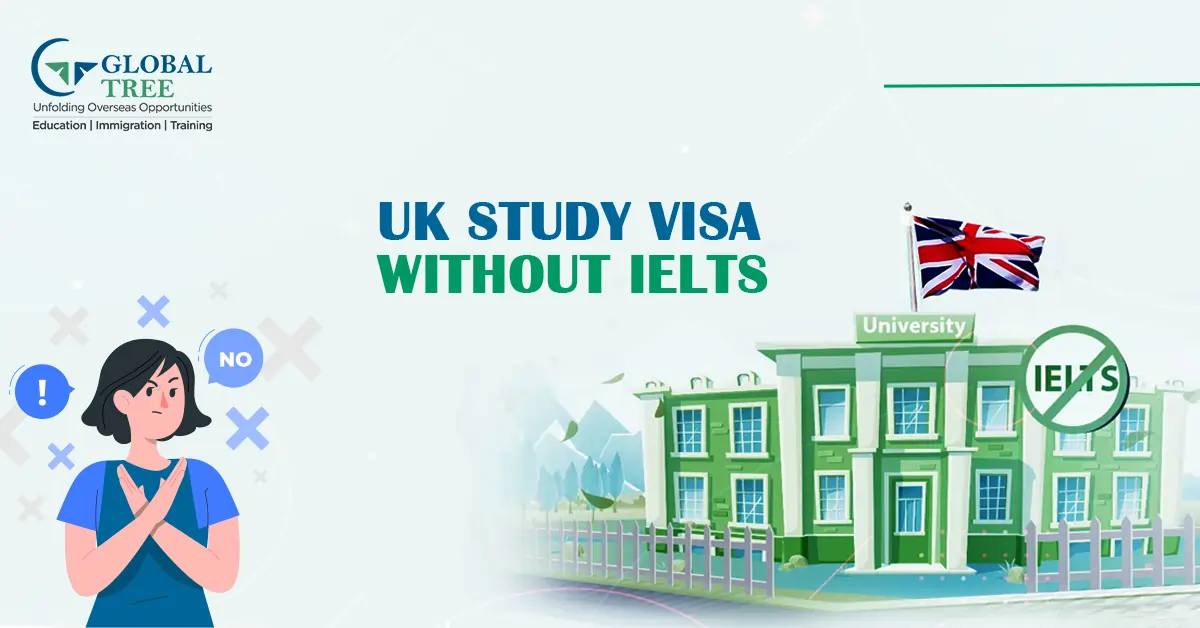UK Study Visa Without IELTS: Your Complete Guide

Introduction
Wondering if obtaining a UK student visa without IELTS is possible? The answer is - YES!
The IELTS is a pivotal requirement factor for obtaining and studying in the UK for all aspiring international students.
While IELTS is a widely accepted benchmark, there is doubt among many whether one can obtain a UK student visa without IELTS.
Therefore, this article will answer all your doubts and help you explore alternative pathways to study in the UK without the need for IELTS.
How to get UK Student Visa Without IELTS?
Obtaining a UK student visa without IELTS is possible, but it depends on certain conditions and exemptions.
The UK Visa and Immigration (UKVI) has specific requirements for English language proficiency, and IELTS is one of the widely accepted tests.
Requirements to get UK Study Visa without IELTS
- Other English Language Tests: You can take alternative English language proficiency tests like TOEFL, Pearson Test of English (PTE), or the Cambridge English Qualifications, which are also accepted by many top UK universities.
- Previous Education in English: If you have completed your previous education in a country where English is the official language, you may be exempt from taking an English language test.
- English-Taught Program: If your course of study is conducted in English and the university can provide a confirmation letter, you might be exempt from the language test.
- Conditional Offers: Some universities offer conditional admission for students who need to improve their English language skills. In this case, you can enroll in an English language course in the UK before starting your main program.
- Visa Application with Additional Requirements: In certain cases, the UKVI may request an interview or additional documentation to assess your English language proficiency.
[Best tips for your IELTS Writing Section! Read now!]
General Requirements for Obtaining a UK Student Visa Without IELTS:
As you embark on your journey to study in the UK without IELTS, obtaining a UK student visa is a pivotal step.
To enhance your chances of success, here's advice on crafting a compelling personal statement, the significance of financial documentation, and the importance of a credible source of funds.
-
Crafting a Compelling Personal Statement:
Your personal statement is your opportunity to shine and convince UK universities and immigration authorities of your suitability as a student.
To make your statement stand out, express your passion for your chosen course, highlight relevant experiences, and showcase how your academic aspirations align with your future goals.
Ensure that it reflects your genuine enthusiasm for studying in the UK, giving a unique perspective on your journey to study in the UK without IELTS.
-
Financial Documentation in Visa Application:
Financial documentation is a critical component of your visa application.
It validates your ability to cover tuition fees and living expenses during your stay in the UK. Compile clear and organized bank statements, scholarship letters, or financial guarantees that demonstrate you have sufficient funds to meet the required financial thresholds.
This documentation is vital for a smooth and successful visa application, making it a key factor in your quest to study in the UK without IELTS.
-
Significance of a Credible Source of Funds:
Immigration authorities place great importance on the credibility of your source of funds. This ensures that the money you're using to fund your studies and living expenses is legitimate and readily available.
Ensure that your funds come from a reliable and documented source, whether it's from personal savings, scholarships, or a sponsor.
A credible source of funds is not only necessary for obtaining your UK Student Visa but also for your financial stability while you study in the UK.
By following these guidelines and providing a well-crafted personal statement, and thorough financial documentation.
A credible source of funds, you'll be better equipped to navigate the complexities of obtaining a UK Student Visa. So, make your dream of studying in the UK without IELTS a reality.
IELTS Alternatives for UK Student Visa
Notably, there are a few other alternative tests to obtain a UK student visa, if you are unsure about taking IELTS.
Let's delve into these alternatives, which offer flexibility and a broader scope for obtaining a UK student visa.
- Alternative Language Proficiency Tests: While IELTS is the most recognized language proficiency test, several alternatives can help international students meet the English language requirements for a UK Student Visa Without IELTS.
Notable options include the Test of English as a Foreign Language (TOEFL), the Pearson Test of English (PTE), and the Cambridge English exams.
These tests assess language skills in a similar manner to IELTS, enabling students to prove their English proficiency through different assessment methods.
- TOEFL (Test of English as a Foreign Language): TOEFL is widely accepted by many UK universities as an alternative to IELTS. Check out this TOEFL Coaching from experts.
It assesses English language skills through reading, listening, speaking, and writing sections, allowing students to showcase their language abilities using a different test format.
- PTE (Pearson Test of English): PTE is another respected language proficiency test accepted by various UK institutions.
This computer-based test evaluates speaking, writing, reading, and listening skills, providing international students with an alternative means of proving their English language capabilities.
[This might be helpful: Best Tips to Score 8+ on PTE Test]
- Cambridge English Exams: The Cambridge English exams, including the First Certificate in English (FCE) and the Certificate in Advanced English (CAE), are considered suitable alternatives for demonstrating English proficiency.
These exams are comprehensive and widely recognized, providing students with diverse options for meeting UK university requirements.
- Exemption Criteria: Beyond alternative tests, exemption criteria offer further flexibility for international students. Students who hail from countries where English is the official language may be exempt from providing additional language proficiency proof.
Likewise, those who have previously studied in English-speaking institutions may be eligible for exemptions. Individual universities may have specific criteria for exemptions, making it crucial to review the requirements of your chosen institution carefully.
[Read More: Check out your eligibility to Study in UK]
By exploring these alternatives and understanding the exemption criteria, international students can navigate the UK Student Visa Without the IELTS route with more flexibility and confidence.
These options ensure that the dream of studying in the UK is attainable for a wider range of students, regardless of their IELTS proficiency.
Why IELTS is Required?
International students typically need to take the IELTS test to study in the UK, unless they have an exemption.
This standardized test plays a pivotal role in the admission process. Its significance can be understood through several key reasons.
- English Language Proficiency Assessment: IELTS is used as a universal tool to evaluate an applicant's proficiency in the English language. Since English is the primary medium of instruction in UK universities, institutions need to ensure that students can effectively comprehend lectures, engage in academic discussions, and produce coursework in English.
- Ensuring Academic Success: The requirement of IELTS helps guarantee that students have the necessary language skills to excel academically. Without these skills, students might struggle with their coursework, leading to academic difficulties and a less-than-optimal educational experience.
- Effective Communication: Beyond academics, IELTS ensures that students can communicate effectively in everyday life. Whether it's ordering at a local cafe, engaging in extracurricular activities, or simply making friends, proficiency in English is essential for a fulfilling and immersive experience while studying in the UK.
- Immigration Compliance: In addition to academic concerns, UK immigration authorities use IELTS as a tool to verify that students have the language proficiency required to live and study in the country. Meeting these standards is crucial for obtaining a UK student visa.
While the requirement of IELTS is widespread, some students may find this to be a challenging obstacle.
Thankfully, there are other ways to study in the UK without IELTS. You can consider universities accepting different language tests, meeting their language requirements, or qualifying for exemptions through past academic success.
These alternatives ensure that deserving students can access the exceptional educational opportunities offered in the UK, regardless of their IELTS proficiency.
[Also check out: A Detailed Guide for IELTS Band Requirement for USA]
Navigating IELTS Waivers for UK Student Visas
For international students aspiring to secure a UK Student Visa Without IELTS, it's valuable to explore universities in the UK that may grant IELTS waivers.
These waivers provide alternative pathways for demonstrating English language proficiency, enhancing accessibility for a diverse range of students. Let's take a closer look at these options and the criteria for obtaining IELTS waivers.
- UK universities without IELTS: Several universities in the UK have recognized the need for flexibility in language proficiency requirements and offer IELTS waivers.
These institutions understand that language competency can be established in various ways and seek to accommodate international students from diverse backgrounds.
Universities like the University of Warwick, the University of Bristol, and King's College London are known for their willingness to consider IELTS alternatives.
- Conditions and Criteria for IELTS Waivers: To obtain an IELTS waiver at these universities, students typically need to meet specific criteria. The conditions vary from one institution to another, but common criteria for IELTS waivers may include:
- Previous Academic Qualifications: Students who have completed their previous academic qualifications in an English-speaking institution or who have studied courses conducted in English may be eligible for waivers.
In such cases, the educational background provides evidence of English language proficiency.
- Standardized Test Scores: Some universities may accept alternative English language proficiency tests, such as TOEFL or Pearson Test of English (PTE), in place of IELTS. Students with scores meeting the institution's designated thresholds may secure a waiver.
[This might be relevant: Guide to English Language Proficiency Tests: IELTS & TOEFL]
- English Language Courses: Completing specific English language courses, such as pre-sessional English programs, can also serve as grounds for obtaining an IELTS waiver. These courses are designed to bolster language skills and can be a suitable alternative.
- Interview or Portfolio Assessment: In certain cases, universities may conduct interviews or assess students' portfolios to evaluate their language proficiency. If you can demonstrate your ability to communicate effectively in English, you may be exempted from IELTS requirements.
- Professional Experience: For postgraduate programs, relevant professional experience may be considered. Demonstrating that you have worked in an English-speaking environment and can effectively communicate may lead to an IELTS waiver.
It's important to note that the specific criteria and conditions for IELTS waivers can vary widely among universities.
As such, it's advisable to reach out to your chosen institution's international admissions department for detailed information and guidance on securing an IELTS waiver for your UK Student Visa Without an IELTS application.
[This might be helpful: How to Study in UK after 12th for Indian Students?]
Wrapping up!
In conclusion, there are viable alternatives to IELTS for international students pursuing a study in the UK without an IELTS path. These alternatives, including other language tests and exemptions, offer diverse opportunities.
We encourage readers to be proactive, consult universities, and seek expert guidance to explore these options. By doing so, they can make informed choices and secure the admissions to Study in UK, bypassing the traditional IELTS requirement.









